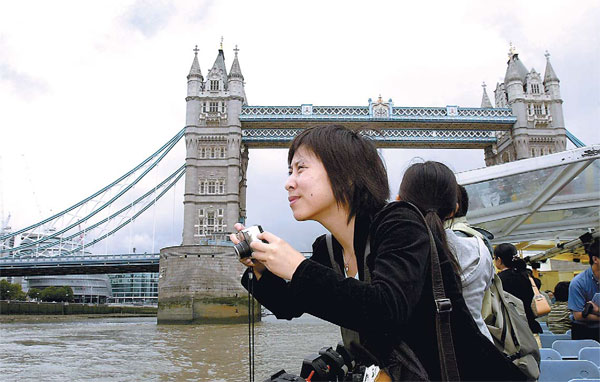Britain steps on accelerator in tourism
Updated: 2015-03-06 07:48
By Cecily Liu(China Daily Europe)
|
|||||||||||
But visa regulations and fees are still seen as a deterrent to prospective Chinese visitors
Chinese tourists are important for Britain's economy because they are big spenders, stay in the country for long periods and are keen on visiting a variety of cities, says Robin Johnson, head of overseas operations at VisitBritain, the UK's national tourism agency.
"Chinese tourists in the UK are growing at a far quicker pace than we had anticipated," Johnson says. "They are also becoming increasingly sophisticated tourists, with specific needs and preferences, moving away from the package tour market."
|
A Chinese tourist takes pictures during a cruise on the River Thames in central London. Photos provided to China Daily |
In the first nine months of last year, Britain welcomed 156,000 visits from China that contributed 411 million pounds ($627 million; 566 million euros) to the country's economy. Chinese tourists spend an average of 2,508 pounds a visit, almost four times the average of all tourists.
To further attract Chinese tourists, VisitBritain has recently conducted a campaign giving landmark London attractions and locations Chinese names that were chosen by the Chinese public.
The Shard is named Lun Dun Zhui, meaning London cone, King's Cross St Pancras is known as Mo Fa Huo Che Zhan, meaning magic station, a reference to Harry Potter; while Savile Row, the men's tailors street, is named Gao Fu Shuai Zhi Lu, meaning Tall, Rich, Handsome Street, an allusion to a Chinese phrase describing the perfect man.
The 1.6 million pound Great Names for Great Britain campaign was done over 10 weeks of voting across China. It is VisitBritain's biggest ever marketing campaign in China, reaching nearly 300 million potential Chinese tourists through the national tourism agency's influential Weibo and WeChat platforms in China.
More than two million people visited the campaign pages, and nearly 30 million Chinese watched the launch video, with 13,000 new names suggested throughout the 10 weeks.
Johnson says the campaign is unique because it invites the Chinese public to become involved in the process of creating the names, so they give their own interpretations, and the consequent names are meant to be more special to Chinese visitors.
"We want the Chinese public to feel that the destinations are welcoming," he says, adding that VisitBritain is now encouraging the named destinations and attractions to adopt these Chinese names in their own marketing material and promotional campaigns if they wish to.
"This would help these destinations to raise awareness in China, and in turn it will legitimize some of the Chinese names in the long term."
Tamara Fraser, UK marketing and sales manager for Global Blue, says Chinese are the top spenders among visitors to the UK, representing a quarter of total international tax-free spending.
"Tax-free shopping, cultural training and UnionPay services are all valuable ways to accommodate these shoppers while they are here, but VisitBritain's new strategy to rename key UK attractions will help to encourage Chinese shoppers to venture in to wider areas across the UK and expand their spend potential in new regions."

Another key VisitBritain project is the Great China Welcome Campaign, which provides guidelines to UK retailers and tour operators on how to welcome Chinese tourists.
For example, luxury hotels can focus on preparing the right food for Chinese visitors and preparing appropriate items such as slippers in hotel rooms, or have Chinese television channels in rooms.
Department stores could recruit Chinese-speaking staff or install UnionPay terminals in their shops, while smaller retailers could provide an information booklet or support material in Chinese.
"The campaign helps businesses to understand China as a market and target their services accordingly," Fraser says.
Johnson says the UK's tourism industry has an image in the eyes of international travelers that is reflected in three aspects, history and heritage, contemporary culture and natural beauty and these advantages were effectively used during the 2012 Olympics campaign to attract tourists.
The country's history and heritage is reflected in architecture, castles, stately homes and other tourism destinations.
Contemporary culture refers to the country's creative industries, including film, music and fashion.
"For example, a film like Downton Abbey would draw together the history and heritage of the country with contemporary culture," Johnson says.
The country's natural beauty is reflected in both its countryside and its cities. For example in London almost 40 percent of the city is green space, characterized by gardens and parks, he says.
One area into which the UK government has put a great deal of effort to attract overseas visitors is the visa application process. This is particularly the case with Chinese travelers, and rules were streamlined last year.
An online application process was set up that has made the application process easier. A great deal of effort has also been made to speed up visa processing times for Chinese visitors. As well, a super premium service offering much faster issue of visas was set up for Chinese tourists.
Another key development is a new rule to refund applicants their application fee if their UK visit takes in cities outside London.
"I'm delighted with all the work that has gone into making the visa application process easier for Chinese travelers," Johnson says.
However, Deirdre Wells, CEO of UKinbound, an industry association, says two key improvements are needed to further encourage Chinese visitors to the UK.
The first is to accept Chinese as a possible language for online applications. There are guidelines on how to fill in the form in Chinese, but the application still needs to be completed in English.
The second is to reduce the fees for the 10-year multiple-entry visa for Chinese visitors, now about 700 pounds an application.
"This is very expensive," Wells says. "It is used by many travelers who come to the UK mainly on business, but also do some leisure activities as a part of their trip. We encourage people to travel frequently, and having a 10-year visa is a great incentive for them to do so."
The US has a 10-year multiple-entry visa for Chinese and Indian visitors that costs a little less than 100 pounds, she says, and she suggests the UK government reduce the cost of its visa to about the same to increase the UK tourism industry's competitiveness.
One issue facing UK tourism is the separate visa application processes for UK and Schengen visas, meaning the latter have held far more appeal for Chinese visitors, who are able to travel to 26 countries on a single visa.
But this could change later this year as the Schengen visa system introduces the need to collect biometric data, and the UK's visa centers already have the capability to collect biometric data.
"There could be a lot more cooperation to together reduce costs and provide convenience for visitors," Wells says.
Johnson says VisitBritain will continue to devote resources and attention to attracting Chinese travelers. It now has nine staff members in Beijing, Shanghai and Hong Kong, which represents one of its largest global teams.
"We are experiencing a record number of visitors from China, but from a marketing perspective there is still a lot of work that can be done, and we are lucky to promote the UK, which is a great destination."
cecily.liu@chinadaily.com.cn
(China Daily European Weekly 03/06/2015 page21)
Today's Top News
Bright Food continues with overseas expansion
China lowers annual GDP growth target to 7%
China faces 'formidable challenges'
Diplomats talk about 'two sessions'
US ambassador to S.Korea attacked
Belgian royal couple to visit China
China faces 'formidable challenges', says Li
China's defense budget to rise about 10%
Hot Topics
Lunar probe , China growth forecasts, Emission rules get tougher, China seen through 'colored lens', International board,
Editor's Picks

|

|

|

|

|

|






